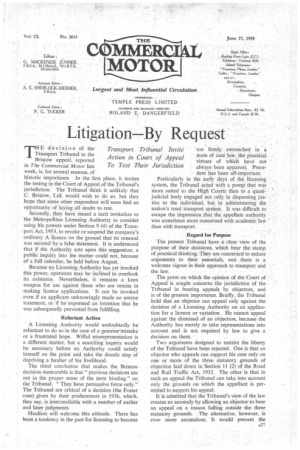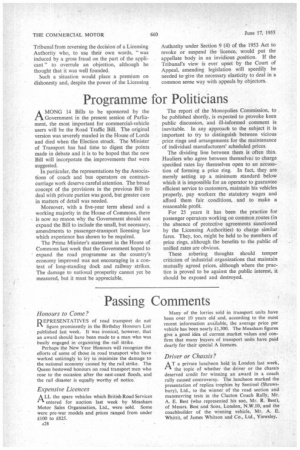Litigation—By Request
Page 29

Page 30

If you've noticed an error in this article please click here to report it so we can fix it.
TH E decision of the Transport Tribunal in the Bristow appeal, reported in The Commercial Motor last week, is, for several reasons, of historic importance. In the first place, it invites the testing in the Court of Appeal of the Tribunal's jurisdiction. The Tribunal think it unlikely that C. Bristow. Ltd. would wish to do so, but they hope that some other respondent will soon find an opportunity of laying all doubt to rest.
Secondly, they hive issued a tacit invitation to the Metropolitan Licensing Authority to consider using his powers under Section 9 (4) of the Transport Act, 1953, to revoke or suspend the company's ordinary A licence on the ground that its renewal was secured by a false statement. It is understood that if the Authority acts uptut this suggestion, a public inquiry into the matter could not, because of a full calendar, be held before August.
Because no Licensing Authority has yet invoked this power, operators may be inclined to overlook its existence. Nevertheless, it remains a keen weapon for use against those who are remiss in making licence applications. It can be invoked even if an applicant unknowingly made an untrue statement, or if he 'expressed an intention that he was subsequently prevented from fulfilling.
Transport Action in To Test Their
Reluctant Action A Licensing Authority would undoubtedly be reluctant to do so in the case of a gentrine-mistake or a frustrated hope. Wilful misrepresentation is a different matter, but a searching inquiry would be necessary before an Authority could satisfy himself on the point and take the drastic step of depriving a haulier of his livelihood.
The third conclusion that makes the Bristow decision memorable is that" previous decisions are not in the proper sense of the term binding" on the Tribunal. "They have persuasive force only." The Tribunal are critical of a decision (the Foster case) given by their predecessors in 1936, which, they say, is irreconcilable with a number of earlier and later judgments.
Hauliers will welcome this attitude. There has been a tendency in the past for licensing to become Tribunal Invite too firmly entrenched in a Court of Appeal mass of case law, the practical virtues of which have not Jurisdiction always been apparent. Precedent has been all-important. Particularly in the early days of the licensing system, the Tribunal acted with a pomp that was more suited to the High Courts than to a quasijudicial body engaged not only in dispensing justice to the individual, but in administering the nation's road transport system. It was difficult to escape the impression .that the appellate authority was sometimes more concerned with academic law than with transport.
Regard for Purpose The present Tribunal have a clear view of the purpose of their decisions, which bear the stamp of practical thinking. They are concerned to reduce arguments to their essentials, and there is a welcome vigour in their approach to transport and the law.
The point on which the opinion of the Court of Appeal is sought concerns the jurisdiction of the Tribunal in hearing appeals by objectors, and is of the greatest importance. Briefly, the Tribunal hold that an objector can appeal only against the decision of a Licensing Authority on an application for a licence or variation. He cannot appeal against the dismissal of an objection, because the Authority has merely to take representations into account and is not required by law to give a decision on them. • Two arguments designed to restrict the liberty of the Tribunal have been rejected. One is that an objector who appeals can support his case only on one or more of the three statutory grounds of objection laid down in Section 11(2) of the Road and Rail Traffic Act, 1933. The other is that in such an appeal the Tribunal can take into account only the grounds on which the appellant is permitted to support his appeal.
It is admitted that the Tribunal's view of the law creates an anomaly by allowing an objector to base an appeal on a reason falling outside the three statutory grounds. The alternative, however, is evoz more anomalous. It would prevent the Tribunal from reversing the decision of a Licensing Authority who, to use their own words, "was induced by a gross fraud on the part of the applicant" to overrule an objection, although he thought that it was well founded.
Such a situation would place a premium on dishonesty and, despite the power of the Licensing Authority under Section 9 (4) of the 1953 Act to revoke or suspend the licence, would put the appellate body in an invidious position. If the Tribunal's view is ever upset by the Court of Appeal, amending legislation will speedily be needed to give the necessary elasticity to deal in a common sense way with appeals by objectors.




























































































